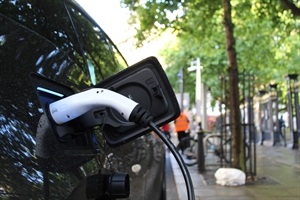Government announces consultation response and next steps on ZEV mandate
Thu 30 March 2023
View all news

The Government has announced its response to the technical consultation on the design of a zero emission vehicle mandate and next steps in the process. It has reaffirmed the commitment to end the sale of all new petrol and diesel cars and vans by 2030 and for all new cars and vans sold after 2035 to be zero emission at the tailpipe. It has also ruled out allowing vehicles to be sold to run on 'expensive' e-fuels after 2035.
It has also effectively ruled out allowing vehicles to be sold to run on 'expensive' e-fuels after 2035 with a clear definition that a Zero Emission Vehicle (ZEV) “must emit no CO2 or any other targeted greenhouse gases at the exhaust and have a minimum range of at least 120miles (WLTP)“.
The ZEV mandate will ensure that vehicle manufacturers have to sell a rising proportion of electric vehicles (EVs) in the lead up to 2030, beginning in 2024. Through the mandate, manufacturers will have ZEV sales converted into ‘certificates’ and be required to hold a certain number at the end of each year in relation to the total number of vehicles which they have sold. Manufacturers that don’t meet their targets will be issued with fines, suggested to be £15,000 per car.
The Government says that it will need further consultation on ZEV mandate target trajectories beyond 2030 and to determine a definition for ‘significant zero emission capability’, as the two provisions are intrinsically linked. (The new consultation will close on 24th May 2023.)
The trajectories proposed in the technical consultation are confirmed in the latest communication. They are that 22% of car production must be EV by 2024, 80% by 2030 and towards 100% by 2035. The van trajectory is higher than originally suggested with 10% by 2024, 70% in 2030 and, ultimately, 100% by 2035.
The Government said earlier that it will continue to regulate the carbon dioxide (CO2) emissions of the non-ZEV portion of the fleet to make sure they do not increase.
Other details confirmed about the ZEV mandate are:
- Banking of ZEV allowances will be allowed, subject to some limits and restrictions.
- Borrowing of ZEV allowances will be allowed between 2024 to 2026, subject to caps on the amount that can be borrowed and with interest payable on the deficit.
- To qualify as a ZEV, new cars and vans will need to meet certain minimum eligibility criteria. Manufacturers will have the possibility of earning additional credits for deploying ZEVs for use in specific applications, such as car clubs or for wheelchair accessible vehicles and special purpose vehicles.
- Exemptions from the ZEV mandate requirements will apply until 2029 for manufacturers selling less than 2,500 cars or vans per annum (small volume manufacturers, SVMs).
- Each manufacturer’s specific, non-weighted average CO2 emissions from the year 2021 will be used as the baseline to regulate the non-ZEV portion of the fleet.
- Exceeding the minimum requirements of the ZEV mandate can be used to offset non-compliance with the non-ZEV CO2 regulation.
The ZEV mandate is a fundamental shift in how the UK regulates CO2 emissions from new cars and vans and will distinguish the UK from the European Union. The document also says that a ZEV mandate with a CO2 regulation for non-ZEVs could, over time, be applied to other road vehicles.
A Consultation on the final design of the zero emission vehicle (ZEV) mandate and CO2 emissions regulation for new cars and vans in the UK has also been published.
Commenting on the announcement of the ZEV mandate consultation, Zemo's CEO Andy Eastlake said: “Working together we have eight weeks to get the ‘Devils out of the detail’ to deliver a world-beating ZEV mandate and put the UK on a clear trajectory to phase out all emitting vehicles by 2035.”
BVRLA Chief Executive, and Zemo Board member, Gerry Keaney, said (Quoted in Transport + Energy): “The ZEV mandate is a critical tool in the UK meeting its ambitious Net Zero targets. The clarity given today will give fleets and motorists the confidence to continue their decarbonisation journey and accelerate the transition to zero emission transport.
“BEV demand is growing – driven by company car fleets – where over 50% of new registrations are electric. We now need supply to keep pace by providing a wider range of vehicles at all price points. The ZEV mandate will help to ensure the right vehicles are coming to the UK, allowing more drivers to make a swift switch to electric.”
Guy Spence, Managing Director of LV= ElectriX, commented: “The requirement for car manufacturers to sell a certain number of electric cars is good news for the British driving community. As ever, the devil is in the detail – it’s essential that the plans are bold enough and there aren’t any loopholes that may jeopardise results. If done right, the Zero Emission Vehicle Mandate will help us reach price parity of electric vehicles with petrol and diesel cars sooner. It should also increase the makes and models of electric cars available and will have the longer-term benefit of a more buoyant second-hand market for electric cars, making EVs more affordable across our communities. In parallel, we must also accelerate rollout of reliable charging infrastructure that is easy to use, safe and accessible.”
Related Links
< Back to news list